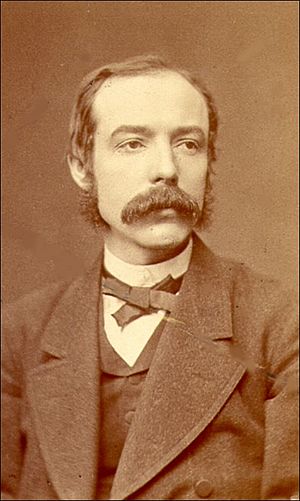Georg Hermann Quincke facts for kids
Quick facts for kids
Georg Hermann Quincke
|
|
|---|---|
 |
|
| Born | 19 November 1834 |
| Died | 13 January 1924 (aged 89) |
| Nationality | German |
| Known for | Streaming current Quincke's interference tube |
| Awards | ForMemRS (1879) |
| Scientific career | |
| Fields | Physics |
| Thesis | De constantibus mercurii capillaribus (1858) |
| Doctoral advisor | H. G. Magnus, F. E. Neumann |
| Doctoral students | K. F. Braun, P. Lenard |
| Other notable students | Albert A. Michelson |
Georg Hermann Quincke (born November 19, 1834 – died January 13, 1924) was an important German physicist. He is known for his work on how liquids behave and for inventing a special tube to study sound waves.
Contents
About Georg Quincke
Georg Quincke was born in Frankfurt-on-Oder, Germany. His father, Hermann Quincke, was a well-known doctor. Georg also had an older brother, Heinrich, who became a doctor too.
His Education and Career
Quincke studied at several universities, including Königsberg and Heidelberg. He earned his Ph.D. degree in 1858 from the University of Berlin.
After finishing his studies, he became a private teacher at Berlin in 1859. He then became a full professor at Berlin in 1865. Later, he taught at the University of Würzburg starting in 1872. In 1875, he moved to Heidelberg to become a physics professor. He stayed there until he retired in 1907.
His Research and Discoveries
Quincke's Ph.D. work was about how mercury behaves in tiny tubes. This is called capillary action. He did a lot of important research on this topic.
In September 1860, Quincke attended the Karlsruhe Congress. This was the first international meeting for chemists. He and another scientist, Adolf von Baeyer, represented the University of Berlin at this event.
Quincke also studied how light reflects, especially from shiny metal surfaces. He spent a lot of time researching how electric forces affect different materials.
Quincke's Interference Tube
One of his famous inventions is called Quincke's Interference Tube. He built this device in 1866. It shows how sound waves can cancel each other out. This is called destructive interference. The ideas behind this tube are still used today in things like mufflers to reduce noise.
Awards and Recognition
Quincke received special honorary degrees from famous universities. He got a D.C.L. from Oxford and an LL.D. from Cambridge and Glasgow. He was also chosen as an honorary member of the Royal Society of London.
In 1885, he wrote a book about the history of the physics department at the University of Heidelberg.
Georg Quincke passed away in Heidelberg when he was 89 years old. He was believed to be the last person alive who had attended the historic Karlsruhe Congress.
See also
 In Spanish: Georg Hermann Quincke para niños
In Spanish: Georg Hermann Quincke para niños
 | Janet Taylor Pickett |
 | Synthia Saint James |
 | Howardena Pindell |
 | Faith Ringgold |

